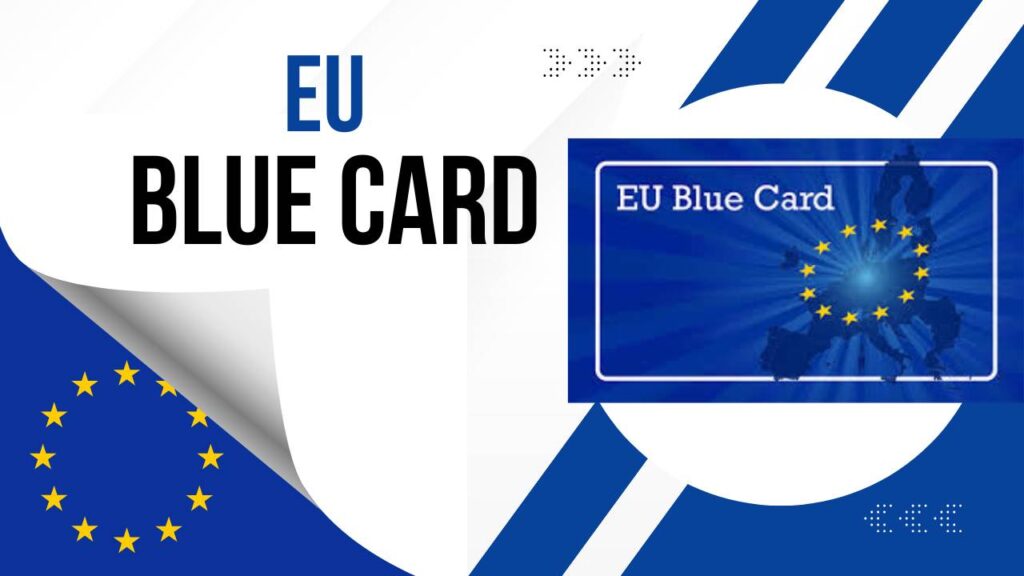As we enter 2025, Europe continues to open its doors to skilled international talent through one of its most progressive immigration pathways—the Europe Blue Card. Designed to attract non-EU professionals in key sectors, the EU Blue Card system not only simplifies the migration process but also offers a host of advantages to individuals and their families.
A tech expert, a healthcare professional, or a researcher, this program allows you to live and work legally in 25 participating EU countries. With significant policy reforms and growing labor shortages across Europe, 2025 presents a golden opportunity for professionals seeking long-term employment and residency in one of the world’s most stable and prosperous regions.
What is the EU Blue Card?
The Europe Blue Card is a unique residence and work permit that grants high-skilled non-EU citizens the right to live and work in an EU member state. It was introduced in 2009 as a response to the increasing need for qualified professionals in sectors like science, engineering, and information technology. Unlike country-specific permits, the Blue Card offers a unified system that allows mobility between member states and provides long-term advantages, such as family reunification and eventual permanent residency.
As of 2025, it remains a centerpiece of the EU’s talent attraction strategy, offering a streamlined process for both employers and employees. By prioritizing transparency and equality, the EU Blue Card enhances Europe’s global competitiveness and ensures that its economies remain dynamic and innovation-driven.
Key Eligibility Requirements for the Europe Blue Card (2025)
To be eligible for a Europe Blue Card in 2025, applicants must meet a set of comprehensive criteria aimed at verifying their professional expertise and employment relevance. First and foremost, candidates must possess a recognized university degree or provide proof of at least five years of relevant professional experience in a high-demand field. This change, introduced to widen accessibility, especially benefits self-taught professionals or those in tech industries who may not hold traditional degrees.
Secondly, a job offer or employment contract of at least 6 months with an EU employer is required. The offer must be in line with the country’s salary threshold, which now ranges from 1.0 to 1.4 times the average gross national salary, depending on the sector and country. Lower thresholds are allowed in professions experiencing severe labor shortages, such as nursing or programming.
Applicants must hold valid health insurance, have a clean criminal background, and demonstrate financial means to support themselves during the initial relocation period. Some member states may ask for proof of housing arrangements or language proficiency, though these requirements vary. The harmonized framework ensures a high level of protection for both employers and migrants, making the process more transparent and fair.
Best Jobs for EU Blue Card Holders in 2025
The EU labor market in 2025 is shaped by digitalization, sustainability goals, and an aging population, all of which have created growing demand for skilled professionals. Below are the top career sectors that qualify under the Europe Blue Card, offering the best prospects and salaries:
1. Information Technology (IT) Specialists
IT remains the backbone of Europe’s digital transformation. Roles such as software developers, AI engineers, cybersecurity analysts, and cloud architects are in high demand across countries like Germany, the Netherlands, and Estonia. With Europe heavily investing in AI, digital infrastructure, and blockchain technologies, the need for skilled tech talent has skyrocketed. Moreover, the recognition of professional experience without a degree has opened the doors for self-taught coders and bootcamp graduates.
2. Healthcare Professionals
The post-pandemic years have left healthcare systems across Europe in urgent need of qualified staff. Jobs such as general practitioners, nurses, radiologists, and clinical laboratory technicians are critically needed, particularly in rural and aging regions. Countries like Germany, Austria, France, and Sweden are even offering fast-track visa procedures, language support programs, and relocation assistance to attract foreign healthcare workers.
3. Engineers and Technical Professionals
Engineering jobs continue to fuel Europe’s infrastructure and green energy projects. Roles in mechanical, electrical, civil, and environmental engineering are in high demand. Many EU countries are launching large-scale smart city and renewable energy projects in 2025, which require international engineering expertise. Professionals with specialized certifications or experience in automation and sustainability will have a competitive edge.
4. Scientists and Researchers
The EU’s Horizon Europe initiative is funding large-scale scientific research in biotechnology, renewable energy, and climate science. Positions for life scientists, chemists, environmental researchers, and material physicists are readily available, especially in countries like Belgium, the Netherlands, and Finland. Blue Card holders in this field often receive support for research grants, project collaborations, and access to laboratories and institutes.
5. Financial & Business Analysts
Post-Brexit Europe is quickly establishing new financial hubs in cities like Frankfurt, Paris, and Amsterdam. The demand for accountants, risk managers, compliance officers, and data-driven financial analysts is growing rapidly. Professionals with international experience, knowledge of regulatory frameworks, and skills in FinTech will find exciting opportunities in Europe’s revitalized financial landscape.
6. Teachers in STEM Fields
The growing importance of STEM education has made mathematics, science, and IT educators highly sought after. Many EU states are struggling with teacher shortages in public schools and vocational institutions. Countries like the Netherlands, Finland, and Germany offer attractive teaching roles under the Blue Card framework, particularly to professionals with experience in bilingual education or international curriculums.
Benefits of the Europe Blue Card in 2025
The Europe Blue Card isn’t just a work permit—it’s a comprehensive immigration package that prioritizes quality of life, career growth, and family stability. Here are the top benefits in 2025:
Fast-Track Permanent Residency
Blue Card holders can apply for permanent residency after just 33 months of legal employment. This can be further reduced to 21 months if you demonstrate proficiency in the local language (usually at B1 level or above). Permanent residency grants access to full social benefits, including pension rights, home ownership, and voting rights in local elections.
Family Reunification and Work Rights
One of the most attractive features is that family members can accompany the cardholder immediately. Spouses are granted full access to the labor market without restrictions, and dependent children can access free or low-cost public education and healthcare services. This benefit significantly reduces the stress of relocation and makes Europe a family-friendly destination for migrants.
Mobility Across EU Countries
After working for 12 months in the first EU country, Blue Card holders can move to another participating country and apply for a new Blue Card there without leaving the EU. This flexibility allows professionals to follow better job opportunities or pursue specialized training and education in different countries, all while maintaining legal residency.
Equal Treatment with Nationals
Holders enjoy equal rights in terms of working conditions, wages, benefits, and tax obligations. This includes access to public health insurance, unemployment benefits, maternity leave, and pension contributions. EU laws also protect Blue Card holders against unfair dismissal and ensure access to legal remedies and administrative justice.
Access to Education and Career Growth
The EU Blue Card allows you to enroll in universities, language courses, and vocational training programs. This helps foreign professionals continue their education or upskill themselves for better roles. Many employers offer career development programs and cross-border exchange opportunities, allowing you to grow within European industries.
Country-Specific Highlights for Blue Card Opportunities
Germany
Germany remains the top destination for Blue Card holders, accounting for over 80% of total Blue Cards issued annually. The country offers a centralized fast-track service, allowing employers to speed up visa processing for key employees. With a high demand in tech, healthcare, and engineering, Germany also provides support through relocation agencies and language training.
France
France’s Talent Passport program aligns closely with the Blue Card and targets professionals in research, arts, and innovation. It offers family integration support, including schooling in English or bilingual institutions, and access to high-standard healthcare. The French government actively promotes diversity and inclusion in the workplace.
Netherlands
The Netherlands offers a vibrant startup ecosystem, friendly tax policies for expats, and a high standard of living. Known for its excellent work-life balance, the country encourages innovation in tech, green energy, and education. The Dutch Blue Card pathway is efficient, digital, and family-friendly, with generous housing and transport benefits.
Sweden & Finland
These Nordic countries are ideal for professionals seeking a high quality of life, gender equality, and green innovation. With a heavy focus on IT, robotics, and sustainable engineering, they offer attractive packages for professionals and their families. Social services like free education, subsidized healthcare, and parental leave make these countries a top choice for long-term migration.
Application Process: Step-by-Step Guide (2025 Edition)
Secure a Valid Job Offer: Ensure the position meets national Blue Card salary and qualification standards.
Prepare Required Documentation:
- Passport, job contract, academic certificates, proof of experience.
- Health insurance documentation and proof of accommodation.
Apply for a National Visa: Submit your application at the consulate or embassy of the EU country.
Enter and Register in Host Country: Once approved, register your address and apply for the Blue Card at the local immigration office.
Receive Residence Permit: Your Blue Card is issued for up to 4 years, renewable depending on your employment.
Track Progress Online: Many countries now offer online application portals for status updates and queries.
Processing times range from 4 to 8 weeks depending on the country, though fast-track options are available in key sectors.
2025 Reforms: What’s New?
Significant reforms to the EU Blue Card directive have been rolled out in 2025, making the program more accessible and competitive:
- Lower Salary Thresholds: Special allowances for professions in shortage lists such as nursing and programming.
- Non-Degree Experience Recognition: Professionals with at least 5 years of experience are now eligible without a formal degree.
- Streamlined Applications: Centralized online portals and faster processing times introduced across most member states.
- Longer Validity: Many countries now issue Blue Cards for up to 5 years, reducing the need for frequent renewals.
These updates were designed to make the Europe Blue Card a global alternative to U.S. and Canadian work visas, with a stronger emphasis on flexibility, family life, and job mobility.
Europe Visa Fee & Cost 2025: Price, Charges, Processing Time
With simplified processes, lower entry barriers, and improved family integration, the Blue Card is a strategic move for any qualified professional. It’s not only about where you work—it’s about where you build a future. And in 2025, Europe is more ready than ever to welcome global talent.
FAQs
1. What is the EU Blue Card?
The EU Blue Card is a work and residence permit for highly skilled non-EU professionals who want to live and work in participating EU countries. It simplifies the immigration process and offers benefits like family reunification and permanent residency.
2. Who is eligible to apply for the EU Blue Card?
Applicants must have a recognized higher education degree or at least five years of relevant work experience, a valid job offer with a salary above the national threshold, health insurance, and meet other country-specific requirements.
3. Which countries participate in the EU Blue Card program?
As of 2025, 25 EU countries participate in the Blue Card program, including Germany, France, the Netherlands, Sweden, and Finland. Some countries like Ireland and Denmark do not participate.
4. How long is the EU Blue Card valid?
The Blue Card is typically issued for 1 to 4 years, depending on the country and length of the employment contract. Many countries now offer Blue Cards valid up to 5 years with the possibility of renewal.
5. Can family members join Blue Card holders?
Yes, family members can join Blue Card holders immediately. Spouses usually receive unrestricted work rights, and children can access education and healthcare.
6. Can I move to another EU country with a Blue Card?
Yes. After 12 months of working in the initial EU country, Blue Card holders can move to another participating EU country and apply for a new Blue Card there without leaving the EU.
7. What are the salary requirements for the EU Blue Card?
Salary thresholds vary by country but generally range from 1.0 to 1.4 times the average national gross salary. Lower thresholds apply for shortage occupations like healthcare and IT.
8. How long before I can apply for permanent residency?
Blue Card holders can apply for permanent residency after 33 months of continuous employment, which can be shortened to 21 months with proof of local language proficiency.
9. Does the Blue Card allow access to social benefits?
Yes, Blue Card holders enjoy equal treatment regarding social security, health insurance, unemployment benefits, and pension rights, similar to nationals of the host country.
10. How do I apply for an EU Blue Card?
You must secure a qualifying job offer, prepare required documents (degree, contract, insurance), apply at the embassy or consulate of the host country, then register locally upon arrival to receive your Blue Card.






